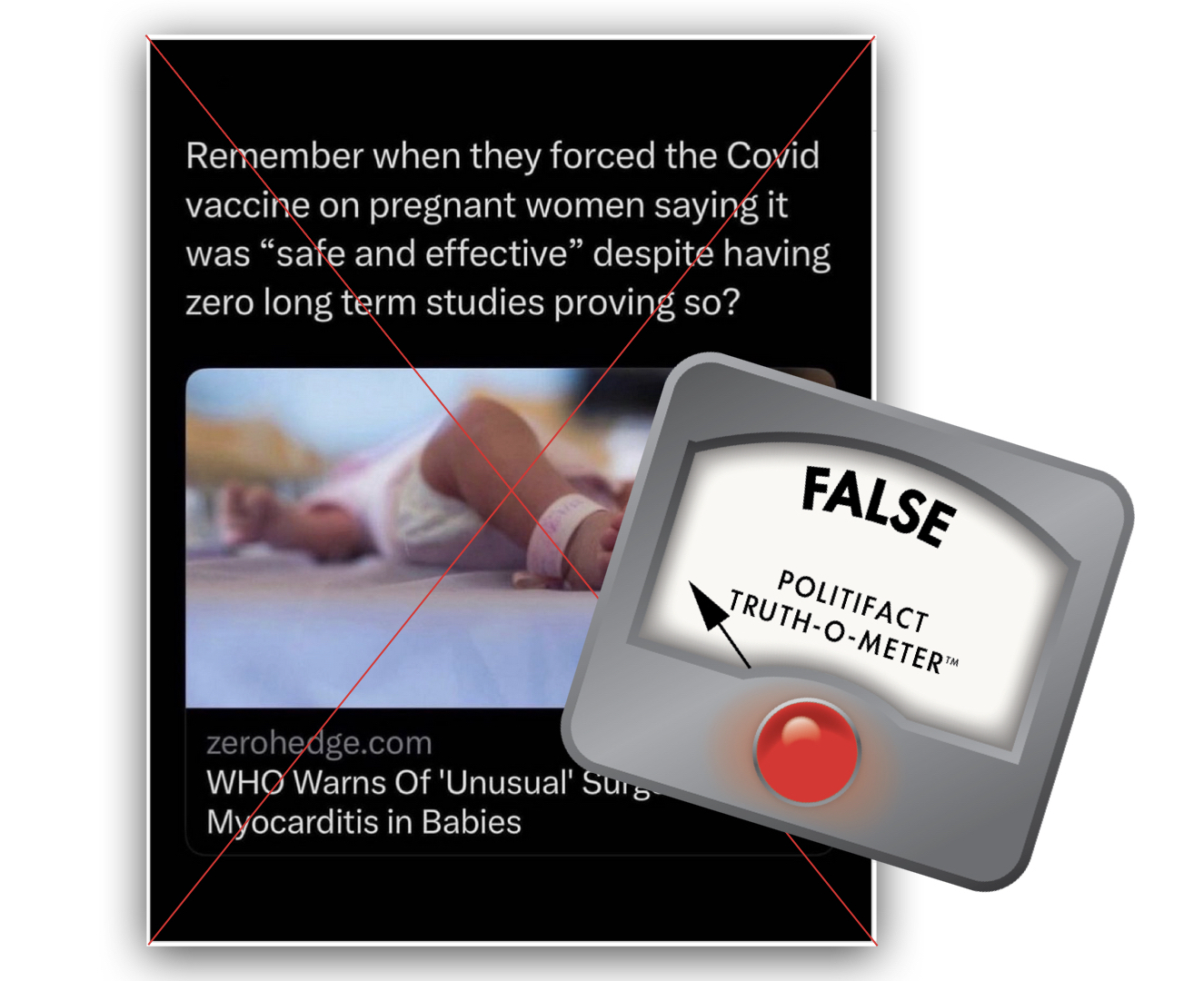

Our only agenda is to publish the truth so you can be an informed participant in democracy.
We need your help.


World Health Organization headquarters in Geneva. (WHO)
Between June 2022 and April 2023 in Wales, 10 newborns under 28 days old developed myocarditis associated with infections from enterovirus, some of the most prevalent viruses in the world, according to the World Health Organization and the Welsh minister for health and social services.
A WHO spokesperson told PolitiFact that at this stage, there is no reason to believe the increase in myocarditis cases among newborns was linked to COVID-19 vaccines.
Health authorities are investigating the situation further, including exploring population immunity and evaluating the pandemic’s impact on how infections circulate.
An unusual spike in the number of newborns in the U.K. developing myocarditis — inflammation of the heart muscle — is fueling online misinformation about COVID-19 vaccines.
A May 21 post shared on Instagram drew an unsubstantiated link between a World Health Organization announcement and the COVID-19 vaccines.
"Remember when they forced the Covid vaccine on pregnant women saying it was ‘safe and effective’ despite having zero long-term studies proving so?" read the posted screenshot. It was immediately followed by a Zero Hedge headline that read: "WHO Warns Of ‘Unusual’ Surge in Severe Myocarditis in Babies."
This post was flagged as part of Meta’s efforts to combat false news and misinformation on its News Feed. (Read more about our partnership with Meta, which owns Facebook and Instagram.)

(Screenshot from Instagram.)
The article on Zero Hedge — a blog website with a history of publishing misinformation — focused on a May 16 WHO disease outbreak alert about an uptick in myocarditis cases among newborns in the United Kingdom. But the myocarditis cases were associated with enterovirus infections, not COVID-19 or the vaccines.
From June 2022 to April 2023 in Wales, 10 newborns younger than 28 days old who were hospitalized and tested positive for enterovirus infections also developed myocarditis, according to the WHO. (The WHO’s statement was first published May 16, but it was updated with corrected numbers May 17.)
"One baby remains in hospital; eight are being managed as outpatients and, very sadly, one baby died," announced Eluned Morgan, the minister for health and social services in Wales, saying that her thoughts were with the families.
In its statement, the WHO said that the most common cause of myocarditis is viral infection, including infection from enteroviruses, which are among the world’s most prevalent class of viruses. The U.S. Centers for Disease Control and Prevention and Johns Hopkins Medicine also list infection as the most common cause of myocarditis.
Dr. Shamez Ladhani, a consultant pediatrician at the U.K. Health Security Agency, described enterovirus as "a common infection of childhood," in a statement to PolitiFact. Enterovirus infections can cause a range of illnesses such as hand, foot, mouth disease or viral meningitis, Ladhani said.
"In very young babies, enterovirus can, on rare occasions, lead to a severe complication called myocarditis — which causes inflammation of the heart," Ladhani said. "Most babies and children recover completely from this."
The reported increase in severe myocarditis associated with enterovirus infection among newborns was unusual, the WHO reported. In the six years before June 2022, only two similar myocarditis cases were identified in the South Wales region, the WHO said.
But at this stage, there is no reason to think that the increase in myocarditis cases among newborns is linked to COVID-19 vaccines, a WHO spokesperson told PolitiFact.
The CDC and U.K. health authorities recommend that people who are pregnant get vaccinated against COVID-19. A growing body of evidence supports that COVID-19 vaccination during pregnancy is safe and effective and does not cause fertility problems, according to the CDC.
In some rare cases, myocarditis has been linked to mRNA COVID-19 vaccines. Those cases, which were often mild and responded to treatment, most frequently occurred in adolescent and young adult men within seven days of receiving the second dose of an mRNA vaccination, the CDC reported.
Research shows that a person’s risk of developing myocarditis is higher after COVID-19 infection than it is after vaccination against COVID-19.
U.K. health authorities are investigating the newborn cases to assess whether they could be linked to the coronavirus pandemic, the WHO spokesperson said.
Wales is "engaged in a clinical study to understand this incident further and learn lessons, including changes in how infections circulate and population immunity following the pandemic," said Morgan, the Welsh health minister. "Parents should be reassured that although there has been an increase in cases, this is still an extremely rare occurrence."
Public Health Wales was working closely with the Noah’s Ark Children’s Hospital for Wales’ pediatric team to investigate, she said.
The health risk for the general population remains low, according to the WHO’s assessment. In some situations, the WHO said it might recommend closing child care facilities or schools to reduce the intensity of enterovirus transmission.
An image shared on Instagram suggested that people getting vaccinated against COVID-19 while pregnant drove an increase in myocarditis cases in babies.
U.K. health authorities are investigating an uptick in myocarditis cases associated with enterovirus infections. The WHO sent out an alert about the myocarditis cases, but it did not identify a link between them and COVID-19 vaccines. A WHO spokesperson said existing research does not suggest a link.
We rate these claims False.
Emailed statement from a World Health Organization spokesperson, May 22, 2023
Emailed statement from Dr. Shamez Ladhani, a consultant pediatrician at the UK Health Security Agency, May 22, 2023
U.S. Centers for Disease Control and Prevention, Myocarditis and Pericarditis, Sept. 27, 2022
Zero Hedge, WHO Warns Of 'Unusual' Surge in Severe Myocarditis in Babies, May 20, 2023
PolitiFact, Websites spin unproven link between Canada, China about coronavirus outbreak, Jan. 28, 2020
PolitiFact, Drug Pfizer is studying for COVID-19 not ‘suspiciously similar’ to ivermectin, Sept. 30, 2021
PolitiFact, Meme claims Obama to ban Social Security recipients from owning guns, July 30, 2015
The Independent, Warning as baby dies and seven more fall critically ill with ‘usually mild virus,’ May 19, 2023
World Health Organization, Myocarditis - United Kingdom of Great Britain and Northern Ireland, May 17, 2023
World Health Organization, Newborn health in the Western Pacific, accessed May 22, 2023
Johns Hopkins Medicine, Myocarditis, accessed May 22, 2023
U.S. Centers for Disease Control and Prevention, Myocarditis, accessed May 22, 2023
Welsh Government, Written Statement: Ongoing investigation into neonatal myocarditis cluster in South Wales, May 3, 2023
National Library of Medicine, World-Wide Prevalence and Genotype Distribution of Enteroviruses, March 2021
The American Heart Association, COVID-19 infection poses higher risk for myocarditis than vaccines, Aug. 22, 2022
CBS News, What research shows about risks of myocarditis from COVID vaccines versus risks of heart damage from COVID, March 13, 2023
American Academy of Pediatrics, COVID-19 Vaccination–Associated Myocarditis in Adolescents, Nov. 1, 2021
U.S. Centers for Disease Control and Prevention, Clinical Considerations: Myocarditis and Pericarditis after Receipt of COVID-19 Vaccines Among Adolescents and Young Adults, accessed May 23, 2023
U.S. Centers for Disease Control and Prevention, Myocarditis and Pericarditis After mRNA COVID-19 Vaccination, Sept. 27, 2022
In a world of wild talk and fake news, help us stand up for the facts.
